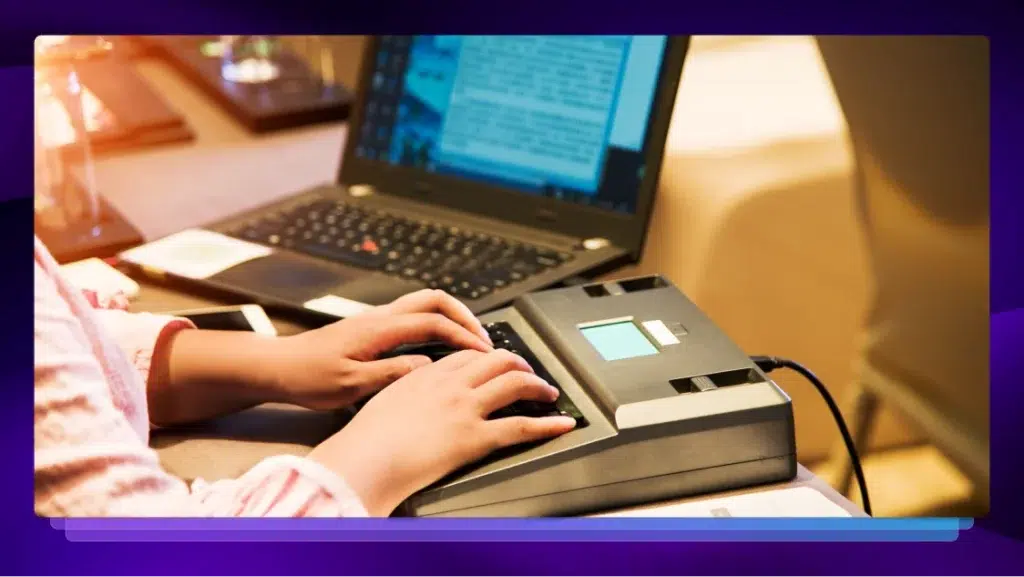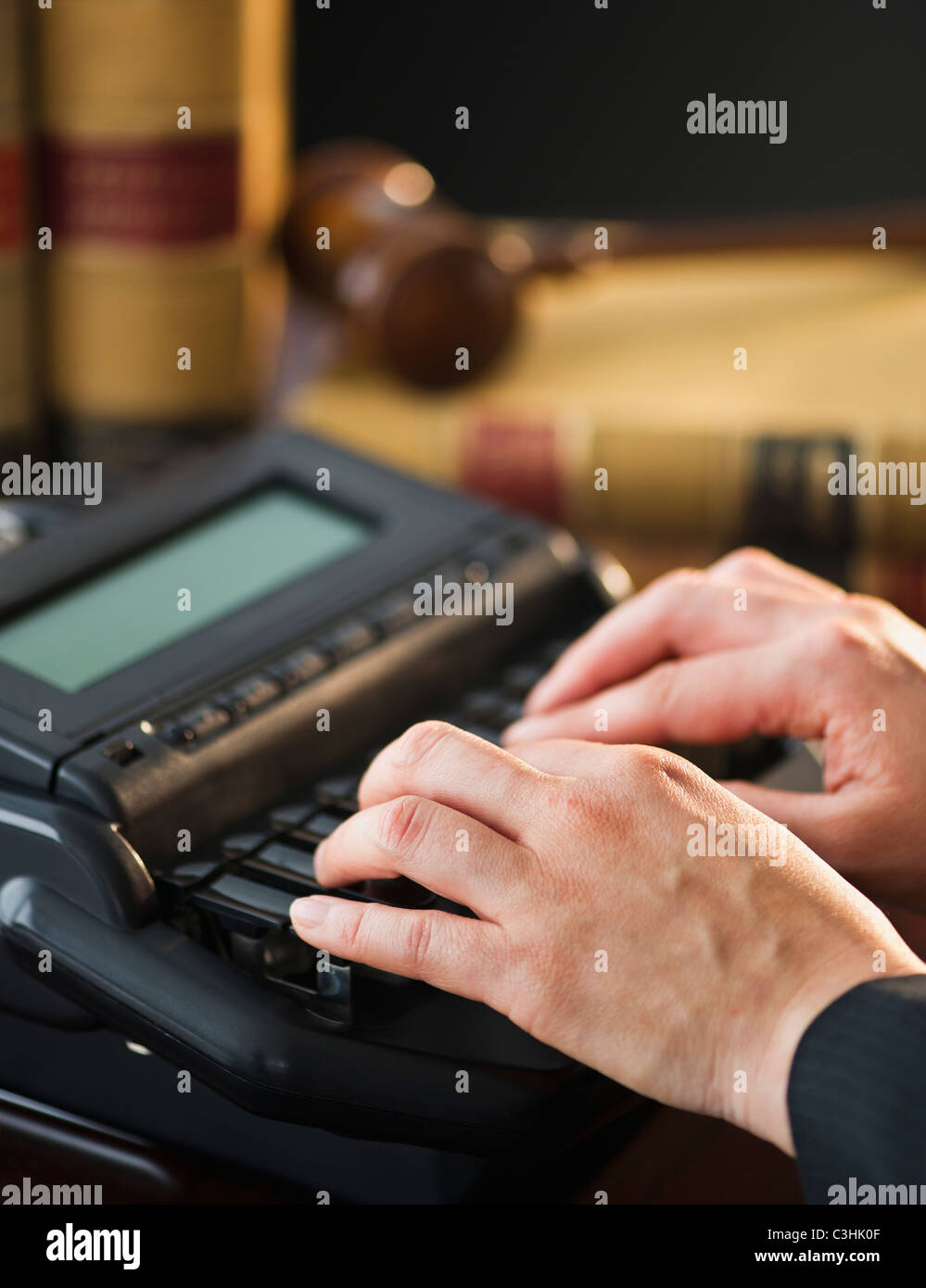Discover the Vital Abilities and Duties of a Court Typist in Today's Lawful Landscape
As a court typist, you hold a critical setting in the lawful system. Your abilities go beyond just keying; they include understanding intricate lawful terms and procedures while making certain accuracy in every record. You work together very closely with lawyers and judges, making your function essential for reliable communication. What certain abilities do you need, and just how can you adapt to the ever-evolving technological landscape? Let's discover this further.
The Function of a Court Typist in the Judicial System
As the foundation of the judicial system, a court typist plays a crucial role in guaranteeing that legal process are properly recorded. You're responsible for transcribing whatever from witness testaments to courts' judgments, capturing every detail with accuracy. Your work helps preserve a irreversible and clear document of court tasks, which is important for future reference and appeals.In the court room, you're frequently the unrecognized hero, quietly ensuring that all talked words come to be created documents. You keep discretion, understanding the sensitive nature of legal matters. You likewise work together very closely with legal representatives, courts, and clerks to ensure the smooth circulation of info. By working efficiently under pressure, you add to the total performance of the judicial procedure. Your focus to information and commitment to accuracy not just promote the honesty of the court yet additionally sustain the wider pursuit of justice in society.
Necessary Abilities Needed for Court Typists
Court typists need a special blend of skills to excel in their important role within the judicial system. Primarily, you have to have excellent typing abilities, commonly accomplishing speeds of 70 words per min or more. Precision is important; even a small error can bring about significant misunderstandings in lawful records. You'll likewise need solid interest to detail, ensuring every word is recorded correctly.Additionally, great organizational abilities are important for handling multiple cases and papers effectively. Being tech-savvy is vital, as you'll utilize different software application for data processing and file monitoring. Strong interaction abilities assist you connect with courts, attorneys, and other court employees effectively.Lastly, a sense of professionalism and reliability and discretion is a must, as you'll deal with delicate information daily. By sharpening these abilities, you'll be well-prepared to add substantially to the court room setting.
Recognizing Lawful Terms and Treatments
As a court typist, you need to grasp key legal terms and procedures to execute your job efficiently. Recognizing these concepts not only helps you transcribe precisely yet also guarantees you can comply with the circulation of court proceedings. Let's discover the vital lawful vocabulary and an introduction of court procedures you ought to know.

Secret Legal Terms
Comprehending essential legal terms is important for anybody working in a court atmosphere. You'll often experience terms like "plaintiff," which describes the individual starting a claim, and "offender," who reacts to the allegations. Recognizing the difference between "civil" and "criminal" instances aids you realize the context of the procedures. Experience with "subpoena" assurances you understand the legal files engaging witnesses to affirm. In addition, terms like "evidence" and "statement" are vital, as they connect directly to the information offered in court. Grasping these terms not just improves your performance as a court typist yet likewise ensures that you add to the precision and clearness of lawful papers. Your role rests on accurate terms, so don't take it gently!
Court Procedures Summary
Knowledge with essential lawful terms sets the phase for understanding court treatments. Comprehending just how a courtroom features is vital for any court typist. You'll encounter procedures like accusations, where offenders hear costs, and movements, which are ask for a court ruling. Acquaint on your own with the duties of clerks, judges, and lawyers, as each plays a crucial component in process. Understanding the flow of a test-- from court option to shutting debates-- aids you precisely catch the process - court typist. Additionally, comprehending the value of keeping a precise and unbiased record can't be overemphasized. By understanding these components, you'll boost your effectiveness in documenting necessary court tasks and add considerably to the legal process. Your function is critical in preserving the integrity of court records
The Effect of Innovation on Court Entering
Technology's changed court keying in considerable methods. With digital transcription devices, you can boost effectiveness and accuracy, making your job easier than ever before. And also, remote court procedures have changed how you approach your job, needing adaptability to brand-new styles and technologies.
Digital Transcription Devices
As digital transcription devices remain to evolve, they're changing the way court typists execute their tasks. These tools enhance the transcription procedure, allowing you to capture spoken words properly and efficiently. With voice acknowledgment software program, you can record real-time procedures, reducing hand-operated input and reducing errors.Moreover, cloud-based systems allow simple accessibility to records, so you can function collaboratively with legal teams and assure every person's on the same page. Automated format features save you time on recurring jobs, letting you concentrate on web content quality.Additionally, digital devices enhance security, safeguarding sensitive details via encrypted storage and click for more controlled access. By welcoming these innovations, you can enhance your productivity and maintain the high requirements needed in the lawful field.
Remote Court Process
The rise of remote court procedures has greatly transformed the landscape for court typists. You currently count on technology to record and transcribe real-time hearings from your office or home. Experience with video clip conferencing systems is important, as you'll need to navigate them perfectly to guarantee a precise record. You'll likewise have to manage audio high quality, as background noise or connection concerns can interrupt your work. In addition, remote process demand fast thinking; you may require to clear up declarations or request repeats in real-time. Staying arranged and reliable is important, as target dates continue to be limited. Welcoming these technological improvements not just improves your skills but likewise ensures you stay an indispensable possession in today's evolving legal environment.
Precision and Attention to Information in Transcription
Accuracy and attention to information are essential in transcription, especially for court typists. court typist. find more Every word matters when you're transcribing lawful proceedings. A solitary blunder can modify the significance of a declaration, possibly influencing the end result of a case. You have to listen thoroughly, assuring that you record every subtlety and inflection in the speaker's voice.Your ability to capture typos and grammatical errors is vital. You don't simply kind; you validate that the final paper is a precise depiction of what was claimed in court. This requires an eager eye and a complete understanding of lawful terminology.Moreover, you'll require to be accustomed to various accents and speaking styles, as courts can hold a range of audio speakers. By refining your accuracy and interest to information, you'll preserve the honesty of lawful documents and contribute considerably to the judicial procedure. Your diligence around absolutely makes a difference

Time Administration and Business Skills
While handling several tasks, efficient time administration and organizational skills are essential for court typists. You'll frequently manage different target dates, from recording court procedures to preparing lawful documents. Prioritizing your workload is crucial; identify urgent jobs and tackle them initially to guarantee prompt submissions.Organizational abilities enter play when you're sorting through case notes, records, and files. Maintaining whatever neatly classified not only saves time yet also lessens the threat of mistake. Utilizing tools like calendars, to-do checklists, or specialized software program can aid you remain on track and handle your time effectively.Moreover, setting particular objectives for every job session can boost your productivity. Break larger projects into smaller tasks to make them extra convenient. By developing these abilities, you'll not just boost your performance but also contribute substantially to the smooth procedure of the legal procedure, ensuring every little thing runs like clockwork.
Continuing Education And Learning and Professional Development Opportunities
Purchasing your abilities does not quit with time administration and organization. As a court typist, you'll locate that continuing education and professional growth are necessary to staying affordable in the legal field. Look for workshops or online training courses concentrating on innovative inputting methods, legal terms, and transcription software. These can develop your abilities and aid you adapt to the most recent technologies.Networking is just as vital. Sign up with professional organizations like the National Court Reporters Organization (NCRA) or local legal organizations. They frequently provide resources, training sessions, and seminars that can improve your understanding and link you with peers.Don' t neglect about accreditation programs that can improve your trustworthiness and marketability. Remaining upgraded with the current patterns and best practices in lawful documentation will certainly improve your efficiency and accuracy, making you an indispensable asset to any type of legal team. Spend in your growth, and you'll enjoy the benefits throughout your job.
Often Asked Concerns
What Is the Typical Salary Array for a Court Typist?
A court typist's common income ranges from $30,000 to $55,000 each year, depending on experience and location. You may also discover opportunities for growth with extra abilities, resulting in increased pay in the legal area.

Are Court Typists Required to Have a Lawful Level?
Court typists do not need a legal degree, but having one can be useful. You'll commonly locate that solid inputting skills and understanding of legal terminology are more vital for success in this role.
What Are the Work Hours for a Court Typist?

How Do Court Typists Ensure Discretion in Their Work?
You guarantee confidentiality by safely taking care of sensitive documents, utilizing encrypted software, and following strict procedures. You stay familiar with personal privacy regulations and only share information with licensed workers, keeping count on the judicial process.
Can Court Typists Job Remotely or Freelance?
Yes, you can work remotely or freelance as a court typist, particularly if you have reputable read review modern technology and a safe atmosphere. Numerous lawful experts currently welcome remote work, offering versatility and opportunities for independent typists. As the foundation of the judicial system, a court typist plays an essential role in guaranteeing that legal process are properly documented. As a court typist, you need to realize crucial legal terms and treatments to do your job effectively. Mastering these terms not only enhances your performance as a court typist but also guarantees that you add to the precision and quality of legal papers. The increase of remote court proceedings has actually greatly transformed the landscape for court typists. As a court typist, you'll find that proceeding education and specialist development are essential to remaining competitive in the legal area.